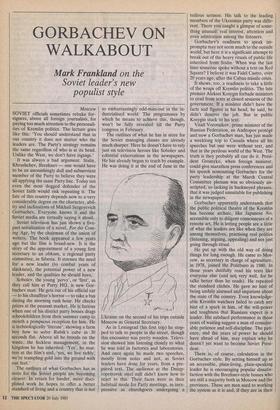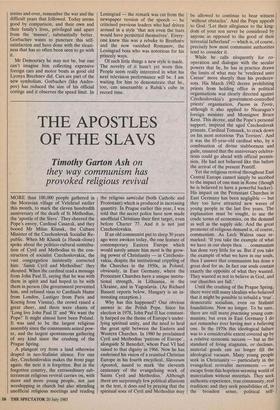GORBACHEV ON WALKABOUT
Mark Frankland on the
Soviet leader's new populist style
Moscow SOVIET officials sometimes rebuke for- eigners, above all foreign journalists, for paying too much attention to the personali- ties of Kremlin politics. The lecture goes like this: 'You should understand that in our country it does not matter who the leaders are. The Party's strategy remains the same regardless of who is at its head. Unlike the West, we don't have zigzags.'
It was always a had argument. Stalin, Khrushchev, Brezhnev — one would have to be an astonishingly dull and subservient member of the Party to believe they were all applying the same Party line. Today not even the most dogged defender of the Soviet faith would risk repeating it. The fate of this country depends now to a very considerable degree on the character, abil- ity and inclinations of Mikhail Sergeyevich Gorbachev. Everyone knows it and the Soviet media are virtually saying it aloud.
Soviet television has just shown a five- part serialisation of a novel, For the Corn- ing Age, by the chairman of the union of writers. The book appeared a few years ago but the film is brand-new. It is the story of the appointment of a young first secretary to an obkom, a regional party committee, in Siberia. It stresses the need for a new leader (to combat years of slackness), the potential power of a new leader, and the qualities he should have.
Sobolev, the young `pervy', or 'first', as they call him at Party HQ, is new Gor- bachev man. He gets out of his official car — to his chauffeur's horror — to take a bus during the morning rush hour. He checks prices at the peasant market. He is furious when one of his district party bosses drags schoolchildren from their summer camp to mouth a pompuous reception for him. He is technologically 'literate', showing a farm boy how to solve Rubik's cube in 30 seconds flat. Above all he broods on the waste, the feckless management, in the kingdom he has inherited. 'Yes', he mut- ters at the film's end, 'yes, we live richly, we're trampling gold into the ground with our feet.'
The outlines of what Gorbachev has in store for the Soviet people are becoming clearer. In return for harder, more disci- plined work he hopes to offer a better standard of living and a country that is not so embarrassingly odd-man-out in the in- dustrialised world. The programmes by which he means to achieve this, though, won't be fully revealed till the Party congress in February.
The outlines of what he has in store for the Soviet managing classes are already much sharper. Here he doesn't have to rely just on television heroes like Sobolev and editorial exhortations in the newspapers. He has already begun to teach by example. He was doing it at the end of June in the Ukraine on the second of his trips outside Moscow as General Secretary.
As in Leningrad (his first trip) he stop- ped to talk to people in the street, though this encounter was pretty wooden. Televi- sion showed him listening closely to what he was told in factories and laboratories. And once again he made two speeches, mostly from notes and not, as Soviet leaders have done for years, from a pre- pared text. The audience at the Dniep- ropetrovsk steel mill didn't know how to react to this. Their faces were in their habitual mode for Party meetings, as inex- pressive as churchgoers undergoing a tedious sermon. His talk to the leading members of the Ukrainian party was diffe- rent. There you caught a glimpse of some- thing unusual: real interest, attention and even admiration among the listeners.
Gorbachev's readiness to speak im- promptu may not seem much to the outside world, but here it is a significant attempt to break out of the heavy rituals of public life inherited from Stalin. When was the last time someone spoke without a text on Red Square? I believe it was Fidel Castro, over 20 years ago, after the Cuban missile crisis.
It shows, too, a readiness to take a little of the wraps off Kremlin politics. The late premier Aleksei Kosygin forbade ministers to read from texts at closed sessions of the government. If a minister didn't have the facts and figures in his head, he said, he didn't deserve the job. But in public Kosygin stuck to his text.
Vitali Vorotnikov, prime minister of the Russian Federation, an Andropov protégé and now a Gorbachev man, has just made a weeklong trip to Canada where all his speeches but one were without text, and that in the perilous world of the West. The truth is they probably all can do it. Presi- dent Gromyko, when foreign minister, could give marathon press conferences and
his speech nominating Gorbachev for•the party leadership at the March Central
Committee plenum was so obviously un- scripted, so lacking in hackneyed phrases, that it was judged unsuitable for publishing in the newspapers.
Gorbachev apparently understands that the public political theatre of the Kremlin
has become archaic, like Japanese No,
accessible only to diligent connoisseurs of a remote art. He is letting people see a little of what the leaders are like when they are among themselves, practising real politics (listening, arguing, appealing) and not just going through ritual.
He put up with the old way of doing things for long enough. He came to Mos- cow, as secretary in charge of agriculture, in 1978, joined the Politburo in 1980. In those years dutifully read his texts like everyone else (and not, very well, for he talks better than he reads). He repeated the standard clichés. He gave no hint of being unduly alarmed and impatient about the state of the country. Even knowledge- able Kremlin watchers failed to catch any hint of a spark in him, of the will-power and toughness that Russians expect in a leader. His subdued performance in those years of waiting suggest a man of consider- able patience and self-discipline. The pati- ence, and the years of power he should have ahead of him, may explain why he doesn't yet want to become Soviet Presi- dent.
There is, of course, calculation in the Gorbachev style. By setting himself up as an accessible, plain-living, plain-speaking leader he is encouraging popular dissatis- faction with the Brezhnev-style bosses who are still a majority both in Moscow and the provinces. These are men used to working the system as it is and, if they are in their sixties and over, remember the war and the difficult years that followed. Today seems good by comparison, and their own and their family's lives, privileged and apart from the 'masses', substantially better. Gorbachev wants to puncture this self- satisfaction and have done with the sleazi- ness that has so often been seen to go with it.
Mr Democracy he may not be, but one can't imagine him collecting expensive foreign cars and motor boats as good old Lyonya Brezhnev did. Cars are part of the new symbolism. Gorbachev (like Andro- pov) has reduced the size of his official cortege and it observes the speed limit. In Leningrad — the remark was cut from the newspaper version of the speech — he criticised previous leaders who had driven around in a style 'that not even the tsars would have permitted themselves'. Every- one knew this was a rebuke to Brezhnev and the now vanished Romanov, the Leningrad boss who was notorious for his princely ways.
Of such little things a new style is made. The novelty of it hasn't yet worn thin. People seem really interested in what his next television performance will be. I am waiting for him to demonstrate that he, too, can unscramble a Rubik's cube in record time.



















































 Previous page
Previous page